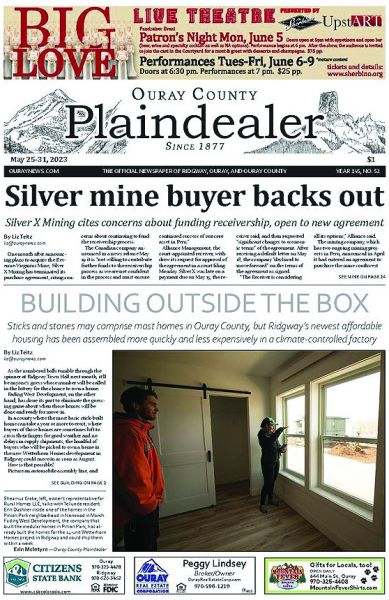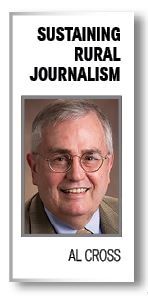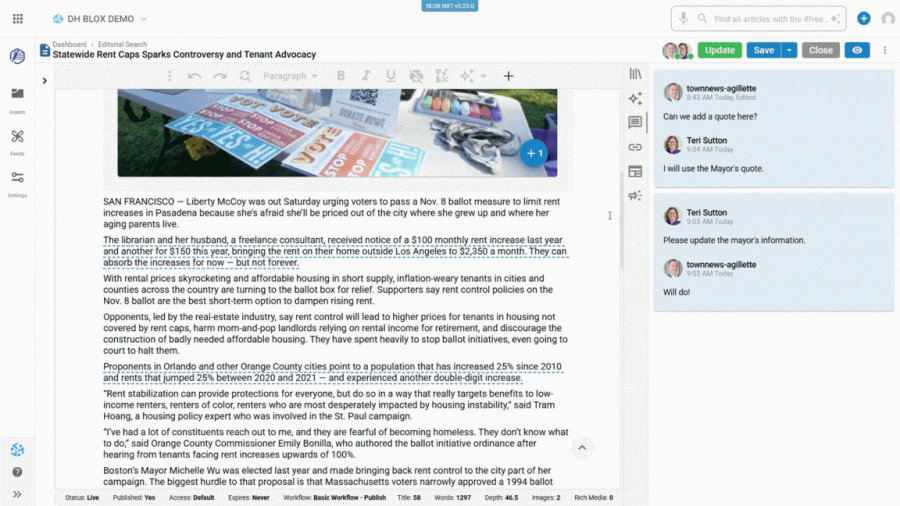Report for America is looking for rural newspapers
Al Cross
Jun 1, 2023



Rural newspapers are missing out on a great deal — subsidized, eager, young reporters who can boost coverage and build the paper’s brand as a public service.
The deal comes from Report for America, an initiative of the nonprofit Ground Truth Project, which for several years has placed journalists in hundreds of local newsrooms to report on under-covered issues and communities.
That includes rural America, and many of its “corps members” are doing rural stories, but not for rural newspapers, so RFA is trying to change that.
“RFA has and will continue to work at sustainability related to local news and rural communities. This is at the heart of our mission,” says Earl Johnson, its vice president of recruitment.
The list of news outlets that have had RFA reporters includes very few rural newspapers, but the smallest news outlet on the list is an illustration of the impact one can have.
That’s the Ouray County Plaindealer in Ridgway, Colorado. The county in the San Juan Mountains has fewer than 5,000 people, but it has a fine newspaper run by Mike Wiggins and Erin McIntyre. Their third RFA reporter just joined the staff, replacing Liz Teitz, who was the first RFA reporter at any Colorado paper and is now at the San Antonio Express-News.
“While we're thrilled for her new position (and have warned her she's not getting rid of us), we know we'll miss her dogged reporting on affordable housing issues here in Ouray County,” McIntyre told the paper’s readers. “Liz has produced hundreds of articles, shed light on complicated problems and sat through countless hours of meetings. She also reported extensively on other topics for the community, using public-records requests and making sense of issues. She listened and told your stories.”
And she may have helped preserve the paper through the pandemic, Wiggins told me.
“I don’t know if we would still own the newspaper if we did not have the reporters that were available to us through Report for America,” he said. He and McIntyre bought the paper in April 2019 and heard about RFA several months later.
Teitz’s three-year contract had RFA pay half her salary the first year, a third of it in the second year and 20% this year. The rest came from the Plaindealer, which got much of the money from its readers by asking them for it.
The weekly raised “tens of thousands” of dollars to help make the match, Wiggins said, agreeing with me that it helped solidify the paper’s brand as a public service.
“If you give people a quality product and you put the resources into the journalism side of things, people will support it,” he said.
Johnson says RFA helps newsrooms “unlock additional streams of revenue that can then be applied to sustaining their news coverage.”
He says newspapers that might be interested in applying for an RFA reporter should have:
- An editorial staff and a “mentoring community” that can support an early-career journalist.
- A salary range mindful of a living wage. “We like to see a minimum of $35,000 per year,” Johnson says. “We find that anything less makes it difficult to recruit and retain a good reporter for the newsroom.”
- An interest in embracing RFA’s fundraising model and a willingness to work with its sustainability team to seek support from the newsroom’s community. “We provide a significant amount of help here,” Johnson says, “and newsrooms who have embraced this model have witnessed fundraising success.”
Other rural newspapers that have or have had RFA reporters include the Malheur Enterprise in eastern Oregon, the People-Sentinel of Barnwell, South Carolina; the Tioga Tribune of North Dakota; the Traverse City Record-Eagle in northern Michigan; the Buffalo Bulletin in Wyoming; and the Rappahannock News in northern Virginia, in conjunction with its supporting foundation, the Foothills Forum.
Rappahannock News RFA reporter Julia Shanahan won second prize for feature writing in the group’s annual contest for her story headlined “A local family’s journey tracing an inescapable lineage of slavery, and their efforts to confront it.”
Applications for the next round of RFA corps members will open in early July, and RFA is actively seeking applications from rural newspapers. They reached out to me, and I’m reaching out to you — in my belief that newspapers must get more revenue from their audiences and my conviction that in the long run, people aren’t going to pay good money for mediocre journalism.
If you have any interest in having an RFA reporter, let me or Earl Johnson know. He’s at ejohnson@reportforamerica.org. And you can always feel free to call me for any kind of help at (859) 257-3744.
Al Cross edited and managed rural newspapers before covering politics for the Louisville Courier Journal and serving as president of the Society of Professional Journalists. He directs the University of Kentucky’s Institute for Rural Journalism and Community Issues. He’s at al.cross@uky.edu.








